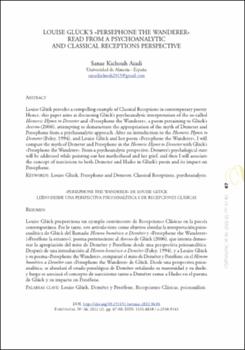Louise Glück’s «Persephone the Wanderer» read from a psychoanalytic and Classical Receptions perspective
Autor
Kichouh Aiadi, SanaeFecha
2022Resumen
Louise Glück provides a compelling example of Classical Receptions in contemporary poetry.
Hence, this paper aims at discussing Glück’s psychoanalytic interpretation of the so-called
Homeric Hymn to Demeter and «Persephone the Wanderer», a poem pertaining to Glück’s
Averno (2006), attempting to demonstrate the appropriation of the myth of Demeter and
Persephone from a psychoanalytic approach. After an introduction to the Homeric Hymn to
Demeter (Foley, 1994), and Louise Glück and her poem «Persephone the Wanderer», I will
compare the myth of Demeter and Persephone in the Homeric Hymn to Demeter with Glück’s
«Persephone the Wanderer». From a psychoanalytic perspective, Demeter’s psychological state
will be addressed while pointing out her motherhood and her grief, and then I will associate
the concept of narcissism to both Demeter and Hades in Glück’s poem and its impact on
Persephone. Louise Glück proporciona un ejemplo convincente de Recepciones Clásicas en la poesía
contemporánea. Por lo tanto,este artículo tiene como objetivo abordar la interpretación psico-
analítica de Glück del llamado Himno homérico a Deméter y «Persephone the Wanderer»
(«Perséfone la errante»), poema perteneciente al Averno de Glück (2006), que intenta demos-
trar la apropiación del mito de Deméter y Perséfone desde una perspectiva psicoanalítica.
Después de una introducción al Himno homérico a Deméter (Foley, 1994), y a Louise Glück
y su poema «PersephonetheWanderer», compararéel mito deDeméter yPerséfoneen elHimno
homérico a Deméter con «Persephone the Wanderer» de Glück. Desde una perspectiva psico-
analítica, se abordará el estado psicológico de Deméter señalando su maternidad y su duelo,
y luego se asociará el concepto de narcisismo tanto a Deméter como a Hades en el poema
de Glück y su impacto en Perséfone.





